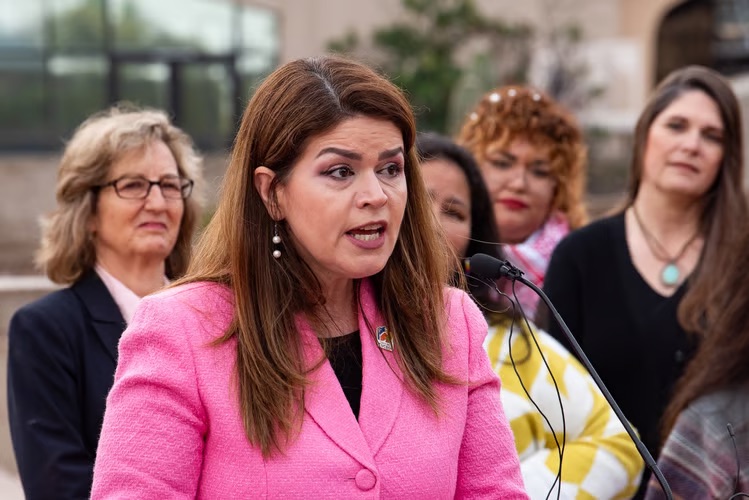This article was originally published by the Tucson Sentinel.

Democrats in Tucson marked the 51st anniversary of Roe v. Wade—the landmark Supreme Court decision that made abortion legal in the U.S.—as part of a nationwide effort, calling November’s election a “clear choice” between protecting women’s freedom, and further bans on abortion and contraception.
On Monday morning, Tucson Mayor Regina Romero was joined by more than a dozen other women, including former state Sen. (and current congressional candidate) Kirsten Engel, state Rep. Stephanie Stahl-Hamilton, Pima County Supervisor Adelita Grijlava and Pima County Recorder Gabriella Cázares-Kelly.
“For five decades, five decades, Roe v. Wade stood as an indispensable pillar of liberty,” said Romero. “For five decades, Roe v . Wade provided the right for individuals to make decisions about their own reproductive health and the ability to control their economic future. For five decades, Roe v. Wade gave us all the ability to plan our families and our future.”
However, “thanks to Donald Trump” and the Supreme Court justices he nominated, the 2022 Dobbs decision “tore down that pillar,” she said. Romero noted the ex-president and current Republican front-runner was on television “bragging about how proud he was to terminate Roe.”
“Make no mistake, if Donald Trump returns to the White House, he will stop at nothing to pass an abortion ban nationwide,” she said. “And it’s not just him. Every person running in the Republican primary has embraced that same anti-woman, anti-freedom agenda.”
Roe v. Wade survived dozens of legal challenges and state-level efforts to restrict abortion rights over the proceeding decades, however in June 2022, the court struck it down along with a 1992 decision known as Planned Parenthood v. Casey.
In Dobbs v. Jackson Women’s Health Organization, Justice Samuel Alito ruled that Roe v. Wade “was egregiously wrong from the start” and said the issue of abortion should be sent back to the states.
Alito was joined by the court’s four conservative justices—including Trump appointees Neil Gorsuch, Brett Kavanaugh and Amy Coney Barrett.
While Chief Justice John Roberts failed to reign in the court, Kavanaugh moved to limit the decision’s effect on a series of other cases based around the constitutional right to privacy. However, Justice Clarence Thomas wrote in a concurring opinion the court should consider challenges to those cases as well, putting not only the right to contraception on the table, but also the right to engage in consensual sexual acts, and gay marriage.
Within weeks, then-Arizona Attorney General Mark Brnovich went to court and sought to resurrect a near-total ban on abortion first added to Arizona’s territorial statutes in 1864. In December, Arizona Superior Court heard arguments whether to implement the territorial ban, or a 15-week ban on the practice passed by the Arizona Legislature.
Over the weekend, hundreds of people marched in Phoenix for abortion rights, while hundreds marched against abortion in Washington D.C., presaging abortion’s likely role in November’s election, which will include major political battles over the White House, a U.S. Senate seat for Arizona, and multiple U.S. House seats.
Meanwhile, state and national Democrats used the anniversary to push for abortion rights, including a proposed amendment to the Arizona Constitution establishing a “fundamental right to abortion.”
Organizers said Monday they have around 250,000 signatures on an initiative to add reproductive rights to the state Constitution. While the group needs 383,923 signatures to put the initiative to voters, organizers have aimed to collect nearly 600,000. A similar effort was launched after the Supreme Court’s decision was leaked in May, but failed to collect the signatures required in time to get on 2022’s ballot.
“On this day 51 years ago, the Supreme Court issued a landmark ruling in Roe v. Wade that protected the right to choose for Arizonans, yet today, women have faced an onslaught of attacks on their fundamental freedoms – all because of Donald Trump,” said Arizona Democratic Party Chair Yolanda Bejarano. “Roe v. Wade would still be in place if not for Trump’s presidency, and now, he’s running on a pledge to ban abortion nationwide, which would rip away freedoms from millions of Arizonans.”
“Arizona is the next abortion battleground- from enshrining abortion rights in our constitution, sending Joe Biden and Kamala Harris back to the White House, delivering a pro-choice Democratic trifecta by flipping the legislature, and rejecting Trump’s favorite extreme anti-abortion Republicans Kari Lake, Juan Ciscomani, and David Schweikert,” she said. “The stakes in November could not be higher, and Arizonans know that freedoms are on the line.”
Romero argued Republicans would push for a nationwide abortion ban under a Trump presidency, and she added the Supreme Court would “go after contraception as well.”
She added President Joe Biden and Vice President Kamala Harris would blunt attempts to pass a national ban, making it nothing but a “twisted right-wing fantasy” and said the Democrats are “the only candidates in this race defending reproductive freedom for all.”
Stahl-Hamilton said this week three bills will come to the Legislature for approval with her support, including a bill to repeal the 1864 ban on abortion, a bill to protect contraception, and a bill limiting how the state collects and publishes data on abortion. During her “State of the State” address earlier this month, Arizona Gov. Katie Hobbs said these “commonsense bills” would “expand access to reproductive healthcare.”
“As I have said before and will continue to say again and again, reproductive freedom is not a partisan issue,” Hobbs said. “Women deserve to have access to the healthcare we need; we deserve to have our individual rights protected; and we deserve to make the personal decisions we deem best for ourselves and our families.”
Romero also criticized U.S. Rep. Juan Ciscomani, who is seeking a second term from Congressional District 6—which includes parts of Tucson extending down through Cochise County, and including parts of Graham and Greenlee. Romero said Ciscomani has already voted for bills limiting abortion rights, and said November’s election leaves voters with a “clear choice” between him and Democratic challenger Engel.
Engel, who lost to Ciscomani two years ago, said she has fought for the freedom to “make our own health care decisions” including abortion and healthcare. She criticized Republicans for using abortion as a “political football.”
“We are here today because we are outraged,” Engel said. “As the mother of a teenage daughter, I am outraged at the fact that she now has fewer rights that I did, fewer rights than her grandmother did 51 years ago.”
She said two years ago, the Supreme Court decided against Roe v. Wade and since then, “we’ve seen a wave of attacks in Congress and state houses across the country to restrict abortion access and deprive women of reproductive health care,” including moves to “criminalize the doctors providing this health care.”
These attacks were “led, encouraged and celebrated” by Ciscomani, whom she called her “anti-abortion, MAGA-enabler opponent,” referencing Trump’s campaign slogan “Make America Great Again.”
“We need to elect people to Congress to who will guarantee our freedoms and not tear them down,” she said. “As a woman and a mom of a teenage daughter, this issue is personal to me and I am eager to join other reproductive rights champions in Congress to guarantee abortion access to all women.”
“We had the right to vote, and the right to abortion,” Engel said. “We lost the right to an abortion, but we can use our vote to restore this right.”
